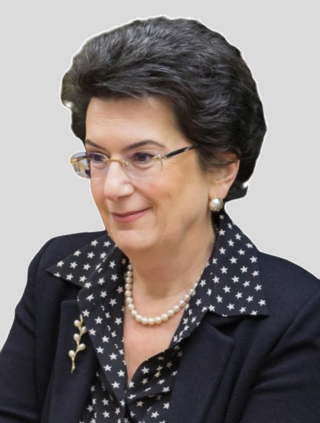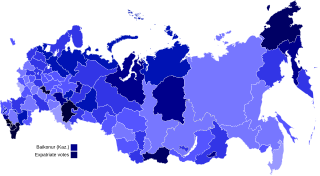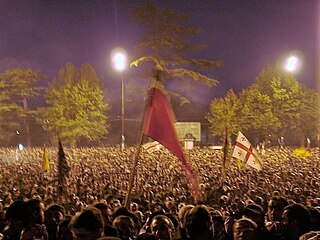| ||||||||||||||||||||
| Turnout | 75.86% ( | |||||||||||||||||||
|---|---|---|---|---|---|---|---|---|---|---|---|---|---|---|---|---|---|---|---|---|
| ||||||||||||||||||||
| ||||||||||||||||||||
 |
|---|
Presidential elections were held in Georgia on 9 April 2000. [1] The result was a victory for Eduard Shevardnadze of the Union of Citizens of Georgia, who received 82% of the vote, with a 76% turnout. [2]
| ||||||||||||||||||||
| Turnout | 75.86% ( | |||||||||||||||||||
|---|---|---|---|---|---|---|---|---|---|---|---|---|---|---|---|---|---|---|---|---|
| ||||||||||||||||||||
| ||||||||||||||||||||
 |
|---|
Presidential elections were held in Georgia on 9 April 2000. [1] The result was a victory for Eduard Shevardnadze of the Union of Citizens of Georgia, who received 82% of the vote, with a 76% turnout. [2]
The OSCE election observation mission concluded that while "fundamental freedoms were generally respected during the election campaign and candidates were able to express their views [...] further progress is necessary for Georgia to fully meet its commitments as a participating State of the OSCE." [3] The OSCE report also highlighted that only two candidates, Shevardnadze and Patiashvili had "campaigned actively". [3]
| Candidate | Party | Votes | % | |
|---|---|---|---|---|
| Eduard Shevardnadze | Union of Citizens of Georgia | 1,870,311 | 82.00 | |
| Jumber Patiashvili | Independent | 390,486 | 17.12 | |
| Kartlos Gharibashvili | Independent | 7,863 | 0.34 | |
| Avtandil Jogildze | National State Union of Georgia–Victorious Georgia | 5,942 | 0.26 | |
| Vazha Zhghenti | Progressive Party of Georgia | 3,363 | 0.15 | |
| Tengiz Asanidze | Independent | 2,793 | 0.12 | |
| Total | 2,280,758 | 100.00 | ||
| Valid votes | 2,280,758 | 97.34 | ||
| Invalid/blank votes | 62,418 | 2.66 | ||
| Total votes | 2,343,176 | 100.00 | ||
| Registered voters/turnout | 3,088,925 | 75.86 | ||
| Source: Nohlen et al. | ||||
Politics in Georgia involve a parliamentary representative democratic republic with a multi-party system. The President of Georgia is the ceremonial head of state and the Prime Minister of Georgia is the head of government. The Prime Minister and the Government wield executive power. Legislative power is vested in both the Government and the unicameral Parliament of Georgia.
Presidential elections were held in Croatia on 15 June 1997. They were the second presidential elections held since independence in 1991. The result was a victory for incumbent president Franjo Tuđman, the leader of the Croatian Democratic Union party (HDZ), who received 61.40% of the vote and was re-elected to a second five-year term. As Tuđman received a majority of the valid votes cast on election day there was no need for a run-off. President Tuđman received a plurality of the votes in 20 of Croatia's 21 counties, while Vlado Gotovac did so in Istria County.

Nino Burjanadze is a Georgian politician and lawyer who served as Chairperson of the Parliament of Georgia from November 2001 to June 2008. As the first woman, she has served as the acting head of state of Georgia twice; the first time from 23 November 2003 to 25 January 2004 in the wake of Eduard Shevardnadze's resignation during the Rose Revolution, and again from 25 November 2007 to 20 January 2008, when Mikheil Saakashvili stepped down to rerun in the early presidential elections. She withdrew into opposition to Saakashvili as the leader of the Democratic Movement-United Georgia party in 2008. In October 2013, she ran in the presidential election, competing against 22 candidates. She ended third with 10 percent of the vote.

Parliamentary elections were held in Georgia on 2 November 2003 alongside a constitutional referendum. According to statistics released by the Georgian Election Commission, the elections were won by a combination of parties supporting President Eduard Shevardnadze.

Presidential elections were held in Russia on 14 March 2004. Incumbent President Vladimir Putin was seeking a second full four-year term. It was a landslide victory for Putin, who was re-elected with 72% of the vote.

Parliamentary elections were held in Georgia on 28 March 2004. They followed the partial annulment of the November 2003 parliamentary elections, which were widely believed to have been rigged by the former President Eduard Shevardnadze. New elections for the 150 seats elected by proportional representation were ordered following the resignation of Shevardnadze and the election of new president Mikhail Saakashvili in January 2004. The results of the 75 seats elected in single-member constituencies in 2003 were not annulled.

The Rose Revolution or Revolution of Roses was a nonviolent change of power that occurred in Georgia in November 2003. The event was brought about by widespread protests over the disputed parliamentary elections and culminated in the resignation of President Eduard Shevardnadze, which marked the end of the Soviet era leadership in the country. The revolution derives its name from the climactic moment, when demonstrators led by Mikheil Saakashvili stormed the Parliament session with red roses in hand.

Belarus elects on national level a head of state—the president—and a legislature. The president is elected for a five-year term by the people. The National Assembly has two chambers. The House of Representatives has 110 members elected in single-seat constituencies elected for a four-year term. The Council of the Republic has 64 members, 56 members indirectly elected and eight members appointed by the president.

Elections in Kazakhstan are held on a national level to elect a President and the Parliament, which is divided into two bodies, the Majilis and the Senate. Local elections for maslihats are held every five years.
The Georgian Armed Forces mutiny of October 1998 was an abortive attempt of a rebellion organized by a group of officers led by Colonel Akaki Eliava in western Georgia against the government of President Eduard Shevardnadze.

Presidential elections were held in Belarus on 19 March 2006. The result was a victory for incumbent, President Alexander Lukashenko, who received 84.4% of the vote. However, Western observers deemed the elections rigged. The Organization for Security and Co-operation in Europe (OSCE) declared that the election "failed to meet OSCE commitments for democratic elections". In contrast, election observers from the Commonwealth of Independent States (CIS) described the vote as open and transparent.

Presidential elections were held in Uzbekistan on 9 January 2000. The result was a victory for incumbent Islam Karimov, who received 96% of the vote. Turnout was reported to be 95%.

Presidential elections were held in Georgia on 5 January 2008, moved forward from autumn 2008 by President Mikheil Saakashvili after the 2007 demonstrations.

Presidential elections were held in Kazakhstan on 10 January 1999. Incumbent president Nursultan Nazarbayev won the election with over 80% of the vote, and was sworn into office on 20 January 1999. Most observers viewed the election as blatantly unfair, further confirming that Nazarbayev was not interested in promoting a democratic system of government. Voter turnout was reported to be 87%.

Presidential elections were held in Georgia on 5 November 1995. The result was a victory for Eduard Shevardnadze of the Union of Citizens of Georgia, who received 77% of the vote, with a 68% turnout.

Presidential elections were held in Georgia on 26 May 1991. The result was a victory for Zviad Gamsakhurdia of the Round Table-Free Georgia party, who received 88% of the vote, with an 83% turnout.

Presidential elections were held in Georgia on 27 October 2013, the sixth presidential elections since the country's restoration of independence from the Soviet Union in 1991. The last elections in January 2008 resulted in the re-election of Mikheil Saakashvili for his second and final presidential term. Saakashvili was constitutionally barred from running for a third consecutive term.

Presidential elections were held in Serbia on 2 April 2017. Incumbent president Tomislav Nikolić was eligible to run for a second five-year term, but opted not to do so. Prime Minister Aleksandar Vučić was elected president in the first round.
The National Independence Party of Georgia (NIP) is a Georgian political party. The party was an important force during the transition from the Soviet Union to independence but subsequently faded and its current status in unknown.
Ilia Chavchavadze Society is a political organisation from Georgia. The group dates back to the days of the Soviet Union, where it was an important factor in the growth of Georgian nationalism.